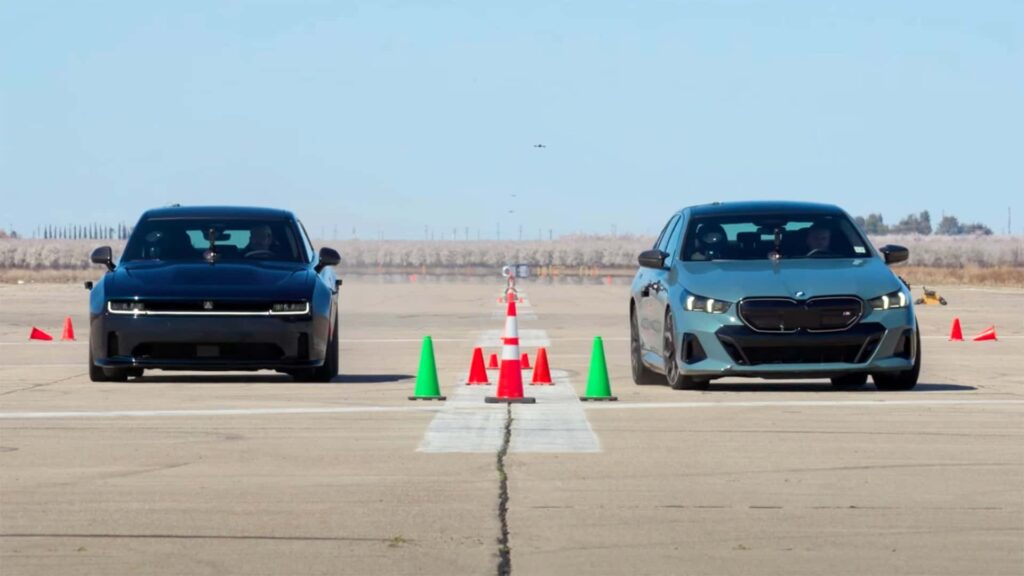In a thrilling head-to-head race, the BMW i5 M60 and the Dodge Charger Daytona EV Scat Pack went wheel-to-wheel in an intense battle of speed and agility. The two cars, with their nearly identical power-to-weight ratios, proved to be evenly matched on the track, showcasing their real-world performance capabilities.
The U-Drag race series by Edmunds put these formidable opponents to the test in a traditional drag race format, complete with a challenging 180-degree corner at the end of the run. The BMW emerged victorious in all three races, but only by the narrowest of margins, highlighting just how closely matched these two high-performance electric vehicles are.
With 670 horsepower under the hood, the Charger boasts more raw power compared to the 593-hp BMW. However, the BMW’s lighter weight gives it a slight edge in terms of horsepower per pound. Despite the Charger’s impressive acceleration and top speed, the BMW’s superior handling and braking capabilities allowed it to maintain a slight lead throughout the races.
During the races, the BMW consistently pulled away from the Charger before the corner, showcasing its superior braking and cornering abilities. However, the Charger’s impressive acceleration from a roll allowed it to close the gap and even challenge the BMW in the second race, nearly claiming victory in a photo finish. With both drivers utilizing their cars’ boost modes for extra power after the corner, the Charger demonstrated its prowess as a straight-line speed machine.
In a recent test drive of the Charger EV, it was noted that while the vehicle excelled in straight-line speed and aesthetics, its cornering and handling left something to be desired. On the other hand, the BMW impressed with its exceptional performance both on straightaways and through corners, defying its size and weight to handle like a smaller, more agile sports car.
While neither car excelled in braking performance, the overall sporty package offered by the BMW ultimately gave it the edge in the race. The BMW i5 M60’s combination of speed, agility, and handling prowess proved to be a winning formula, solidifying its position as the victor in this closely contested battle of electric performance vehicles. When comparing the performance of the BMW i5 to the new four-door electric Charger sedan, one key factor that may tip the scales in favor of the BMW is the additional weight of the Charger sedan. The Charger sedan, being an electric vehicle, typically carries more weight due to the batteries required to power the vehicle.
The weight of a vehicle can have a significant impact on its performance, especially in terms of acceleration and handling. A heavier vehicle may not be as quick off the line or as nimble around corners as a lighter one. In a head-to-head comparison between the i5 and the Charger sedan, the BMW’s lighter weight could give it an edge in terms of overall performance.
The BMW i5 is known for its sporty handling and impressive acceleration, thanks in part to its lightweight construction. The Charger sedan, on the other hand, may struggle to keep up with the i5 in terms of performance due to its heavier weight.
In addition to performance, the weight of a vehicle can also affect its efficiency and range. Heavier vehicles typically require more energy to move, which can result in decreased fuel efficiency or range for electric vehicles. In this case, the Charger sedan may have a shorter range or require more frequent charging compared to the i5.
Overall, while the Charger sedan may offer some advantages in terms of its electric powertrain and four-door practicality, its additional weight could be a limiting factor when it comes to performance and efficiency. For those seeking a more dynamic driving experience, the BMW i5 may be the better option in this head-to-head comparison.

